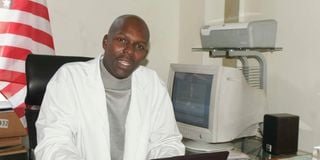400 PEV rape victims accuse firm of ‘destroying’ samples, demand Sh25 million each

Mr Kinyanjui Murigi, director and head of humanitarian services at CSI Nairobi, in a picture taken on December 5, 2011.
More than 400 rape victims of the 2007/2008 post-election violence seeking compensation from a South Korean DNA testing company for illegally destroying samples that were to be used to pursue justice.
The company has allegedly failed to issue a formal apology to the victims.
They say they took the samples to HUMANPASS, a South Korean research institute, for safe storage because the situation in Kenya was volatile and the evidence could have been destroyed or tampered with.
In 2020, they say, a funding opportunity arose that was to help analyse and profile the samples on their behalf.
But when they asked HUMANPASS for the samples, they were shocked to be told that they had been destroyed.
They claim they had not been consulted and that the company’s action was illegal and an injustice against them.
Through a local human rights group, each rape victim is demanding Sh25 million in compensation. If the South Korean government fails to take action, they will seek legal redress.
According to Mr Kinyanjui Murigi, the director and head of humanitarian services at CSI Nairobi, on February 7, 2020, they wrote to the President of South Korea and other government officials regarding the matter.
However, three years later, they have not received any response from the South Korean government.
Mr Murigi said that they have now resorted to writing to United States President Joe Biden to assist the rape victims access justice.
In a letter dated April 27, 2023, Mr Murigi noted that all their letters addressed to the government of South Korea to address the injustice against the victims have been ignored.
Mr Murugi said South Korea fought Japan to secure justice and compensation for her victims of World War II atrocities of rape committed by the Japanese Imperial Forces, but has failed to do the same for Kenya’s victims.
He said the South Korean rape victims, also referred to us ‘Comfort Women’, have since move on with their lives having received an apology and financial compensation from the government of Japan and yet Kenyan victims are still seeking justice.
“We are surprised that when it is South Korea’s turn to provide justice and financial compensation to victims of rape whose evidence was destroyed in South Korea, their pleas fall on deaf ears,” said Mr Murugi
“Our effort to have this matter settled in courts at the ICC and East Africa have proven to be an exercise in futility as no court has jurisdiction. Our tears and cries for justice have therefore brought us to you.
“This company recognises your global leadership role during these challenging times for humanity. We are hopeful that you will find space and time to address this crucial matter of Kenya’s rape victims who have suffered great injustice in South Korea,” he noted.
Forensic evidence
CSI Nairobi, with its international partners, made global history by becoming the first firm to collect, catalogue and store crucial forensic DNA evidence from about 700 sexual assault victims during a time of active unrest.
The company says the only scientific evidence pertaining to the 2007-08 post-election violence that could be used by the International Criminal Court (ICC) and Kenyan or regional courts in prosecuting suspects was available in those samples.
A consultant located the facility in South Korea that would help them securely store the samples as they sought funds.
The victims note that the destruction of the samples was a unilateral decision, undertaken without their knowledge or consent, saying the act is a crime against Kenya’s victims of sexual assault and a gross violation of their human rights.





